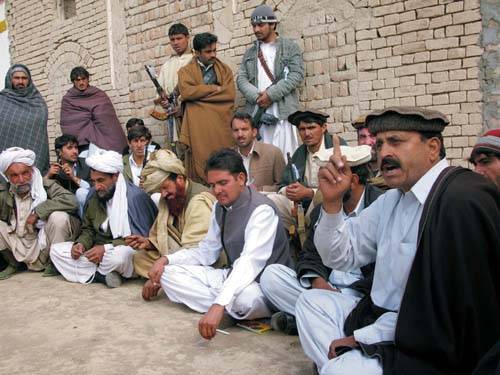It has barely been a week since the National Assembly (NA) passed a bill giving legal and constitutional cover to traditional dispute resolution methods such as the jirga and the panchayat, and even before we could get a glimpse of an ‘official’ jirga in action, a ruling by a tribal jirga in Jacobabad has resulted in the Chief Justice of Pakistan taking sou moto action in the case.
Two girls between the ages of 4 and 8 were to be handed over to be married into the family of the claimant when the defendant - a labourer and father of the two - was unable to pay a stringent fine of Rs 1.3 million imposed by the jirga. The incident shows the worst of the traditional system, as poverty, illiteracy custom and archaic world views result in cruel consequences for two minors.
While the practice of Vani is illegal and three members of the jirga were duly arrested, the part of this episode that should concern the government the most is the fact that the relief given to Muhammad Hashim Khoso - the labourer - was a product of chance. He protested outside the Jacobabad Press Club, and through a mixture of media coverage and luck his plight drew the attention of the Chief Justice.
This is why when the government allows jirga and panchayats to pass legally binding judgement and then disallows the applicants from appealing to a court, it creates fertile ground for future injustices. How will an applicant protest an unfair, disproportionate or obscene punishment, if he is told by the judiciary and law enforcement that the judgment of the Jirga is final, and that he should have taken care before agreeing to traditional dispute resolution? Agreeing to be judged by the jirga is less of a choice than it is made out to be, social and economic pressures force people like Muhammad Khoso to seek local and “amicable” ways to solve dispute.
While the new law will create a “neutral arbiter” to head the official jirga, the official can be a bureaucrat or a cleric rather than someone from the legal profession. Allowing any bureaucrat or cleric to become such an arbiter will result in decisions coloured by personal and religious biases. Local officials sometimes share the archaic viewpoints of the locality, and their familiarity with the area is a clear conflict of interest.
Only legally trained and specially educated arbiters should be given this job - even it requires the government to make substantial further investments towards maintaining such pool - otherwise the village elder will have the same authority as Supreme Court judges, and not even a fraction their education and expertise.






